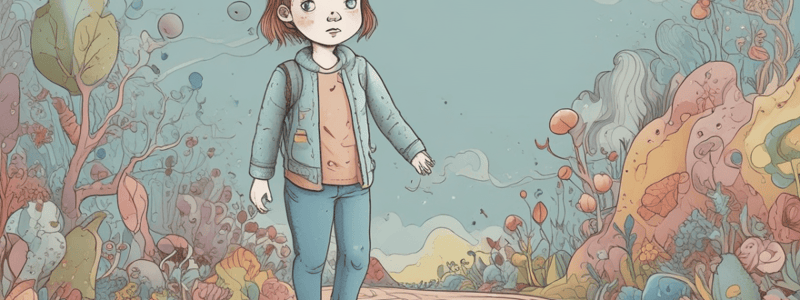Podcast
Questions and Answers
What is a common physical characteristic of individuals with XXY syndrome?
What is a common physical characteristic of individuals with XXY syndrome?
- Shortened torso
- Tall stature (correct)
- High hairline
- Webbed neck
Which symptom is NOT typically associated with Turner Syndrome?
Which symptom is NOT typically associated with Turner Syndrome?
- Heart defect
- Failure of ovaries to develop
- Tall stature (correct)
- Low hairline at neck
What percentage of girls with Turner Syndrome have hearing disorders?
What percentage of girls with Turner Syndrome have hearing disorders?
- 90-95%
- 20-40%
- 50-90% (correct)
- 25-65%
What is the common chromosomal notation for individuals with Turner Syndrome?
What is the common chromosomal notation for individuals with Turner Syndrome?
Which of the following symptoms is common in Turner Syndrome but not in XXY syndrome?
Which of the following symptoms is common in Turner Syndrome but not in XXY syndrome?
Which mechanism contributes to chromosomal genetic variation?
Which mechanism contributes to chromosomal genetic variation?
How many possible combinations of chromosomes result from independent assortment in humans?
How many possible combinations of chromosomes result from independent assortment in humans?
How many possible offspring combinations are there in humans due to random fertilization, excluding crossover?
How many possible offspring combinations are there in humans due to random fertilization, excluding crossover?
What is the presence of 2 or more genetically different sets of cells in an individual called?
What is the presence of 2 or more genetically different sets of cells in an individual called?
Which phase of meiosis does crossing over occur?
Which phase of meiosis does crossing over occur?
What does aneuploidy refer to?
What does aneuploidy refer to?
How many genetically unique daughter cells result from a single crossing over event?
How many genetically unique daughter cells result from a single crossing over event?
What is trisomy?
What is trisomy?
Which of the following is a symptom of Down Syndrome?
Which of the following is a symptom of Down Syndrome?
What is the chromosomal condition associated with Klinefelter's syndrome?
What is the chromosomal condition associated with Klinefelter's syndrome?
Which additional feature is always present in individuals with Down Syndrome?
Which additional feature is always present in individuals with Down Syndrome?
What is the main cause of Klinefelter's syndrome?
What is the main cause of Klinefelter's syndrome?
Which syndrome is characterized by low birth weight and cardiac/renal malformations?
Which syndrome is characterized by low birth weight and cardiac/renal malformations?
A child with polydactyly and neurological problems is likely to have which syndrome?
A child with polydactyly and neurological problems is likely to have which syndrome?
What chromosomal anomaly causes Down Syndrome?
What chromosomal anomaly causes Down Syndrome?
Which of the following is not a symptom of Patau Syndrome?
Which of the following is not a symptom of Patau Syndrome?
Flashcards are hidden until you start studying
Study Notes
Down Syndrome
- Cell cycle is arrested at metaphase, and chromatids are purified, Giemsa stained, and analyzed for number and rearrangements.
- Symptoms include low muscle tone, single deep crease across the center of the palm, looseness of joints, small skin folds at the inner corners of the eyes, and excessive space between the first and second toe.
- Mental retardation is always present, ranging from mild to severe, with most cases being mild to moderate.
Trisomies
- Patau Syndrome (Trisomy 13): characterized by polydactyly, deformed/rocker-bottom feet, neurological problems, facial defects, and cardiac/renal defects.
- Edwards Syndrome (Trisomy 18): characterized by low birth weight, prominent occiput, clubbed hands, neurological problems, facial defects, and cardiac/renal malformations.
Klinefelter's Syndrome
- Results from nondisjunction of the 21st chromosome (Trisomy 21), leading to characteristic facial and body patterns, and varying mental abilities.
- Occurs when a sperm containing both X and Y combines with an egg containing the X, resulting in a male child with an extra X chromosome.
- Leads to sterile males with female characteristics.
Genetic Variation
- Three mechanisms contribute to chromosomal genetic variation: independent assortment of chromosomes, crossing over, and random fertilization.
- Independent assortment reshuffles alleles and chromosomes every generation, resulting in 2^n possible combinations (8,388,608 for humans).
- Random fertilization leads to 70 trillion possible offspring (excluding cross over).
- Mosaicism, the presence of 2 or more genetically different sets of cells, can affect the expression of genetic disorders.
Mosaicism
- All females are mosaics due to X-chromosome inactivation (lyonization).
- Can be caused by a mitotic error soon after fertilization.
- 5% of Down Syndrome patients are a mosaic variant, with only some cells having a trisomy 21.
Independent Assortment
- With n=2, there are 4 possibilities (A and a, B and b, C and c) and 8 possible combinations.
- The "2" rule states that the number of possible chromosome sorting combinations is 2^n.
Cross Over
- A single crossing over event leads to 4 genetically unique daughter cells.
- Crossing over occurs during Meiosis I, resulting in recombinant chromosomes.
When Things Go Wrong
- Aneuploidy: any deviation from the normal number of chromosomes, usually meaning a cell nucleus possessing too many or too few chromosomes.
- Somatic aneuploidy: non-heritable and has a localized effect.
- Meiosis can lead to trisomy, monosomy, or tetrasomy.
Karyotype
- XXY (Klinefelter's Syndrome): males with some development of breast tissue, little body hair, and small testes, leading to infertility and possible mental retardation.
- Turner Syndrome (XO): sterile females with webbed necks, shortened torso, and a range of physical and developmental abnormalities, affecting 1 in 2,000 live births.
Studying That Suits You
Use AI to generate personalized quizzes and flashcards to suit your learning preferences.




